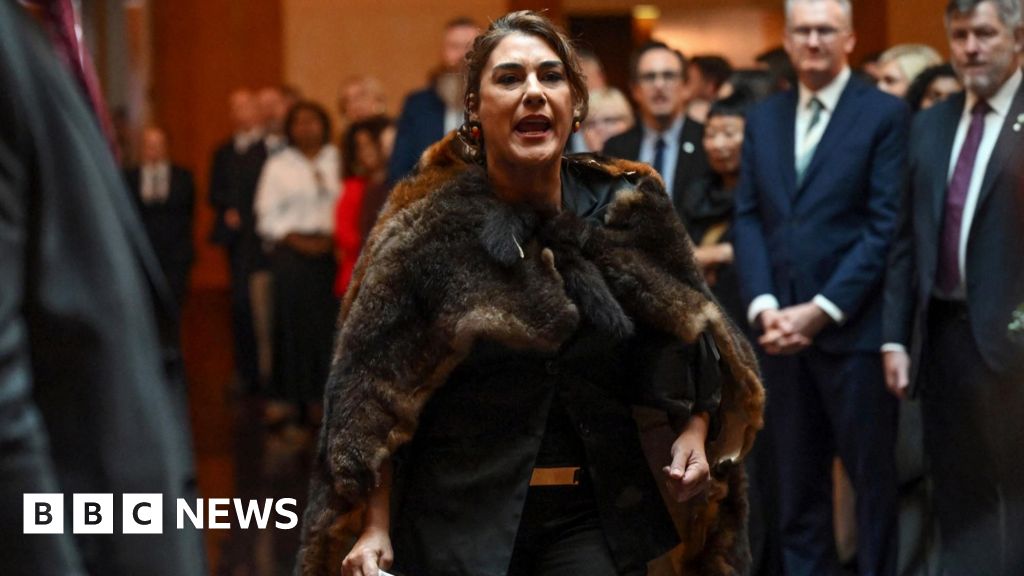ARTICLE AD BOX
By Lara Owen
BBC 100 Women
Image source, Getty Images
"It breaks my heart that people in the street were approaching me, asking me to cover my face," says Soraya. "Even the tailor I visited told me to cover my face before I could speak to them."
Soraya, who owns a small business in Kabul, never believed that she would be made to wear a burqa, like the one the Taliban enforced during their first stint in power in the 1990s. But on 7 May women's faces became the latest restriction, after Afghanistan's ruling Taliban announced that women must wear an all-covering veil in public for the first time in decades. Taliban officials described the face veil decree as "advice" but laid out a specific set of escalating steps for anyone not complying.
And when Soraya took her usual trip to the shops in western Kabul this week, something else had changed. Taliban representatives were inside women's clothing shops to oversee what shop assistants were selling and whether the length of the tailor-made outfits was deemed appropriate.
"I was scared," says Soraya.
Image source, Getty Images
Image caption,The Taliban imposed one of the harshest restrictions since they seized power, ordering women to cover fully in public, ideally with the traditional burqa
Since the Taliban returned to power in August 2021, they have issued various edicts restricting the freedom of women - banning them from government jobs, secondary education and from traveling more than 45 miles (72km) without a mahram, or male guardian.
Some women in Afghanistan say the edict about the use of face veils is just the latest attack on their human rights.
"It's like being a woman in Afghanistan is a crime," says Sana, who lost her job due to the Taliban takeover and is struggling financially.
"It doesn't matter what they choose for me in terms of dress - I am not leaving my house anyway, the situation is hopeless."
Male guardian in charge
Most Afghan women already wear some form of hijab, a scarf that covers the head and neck, but the new restrictions require women to either wear a full niqab, which covers the face but not the eyes, or a burqa, covering the body and full face with a mesh over the eyes.
It's their mahram or male guardian, who is usually a close male relative, who will have to police their dress, otherwise they could face punishment. The men could be summoned to see ministry officials, and potentially even be sent to court or jailed for three days. Women with jobs could be fired.
Feeling the brunt of new restrictions, some women are risking their safety to speak up.
A group in Kabul protested this week against the clothing mandate by wearing traditional Afghan dresses.
"In the past eight months the Taliban have done nothing for us except policing our dress, there is political and economic instability and the Taliban are not solving these issues first," says protester Maryam.
Image source, Rukhshana Media
Image caption,'Don't take the air from us,' reads one of the protester's banners
Some protesters told the BBC that when they tried to take to the streets in protest on Tuesday they were stopped by Taliban officials.
"They made me stand in the same spot for two hours, they took my mobile phone and threatened to take us to the police station," says Hajira.
The BBC Afghan Service contacted the Taliban for comment on the incident, but did not receive a reply.
Defiant in the streets
Anoushah, a women's rights activist in Kabul, says she also decided to take a stand. "The first day of the decree I went out on purpose with my 12-year-old son to all the city spots wearing my normal attire, showing my face. I wanted to run into a member of the Taliban to challenge them."
Sheikba, who says she is an atheist, vows to fight against any pressure to change the way she dresses - despite her recent run-ins with the authorities. On her way to university, she was stopped by a Taliban official for not wearing what was deemed the correct attire.
"I tried to reason with him about it being too hot, but when he insisted I had to cover myself," she says.
Image source, Getty Images
Image caption,A poster ordering women to cover themselves by the entrance gate of a private university in Ophiyan, Parwan province
Sheikba says she has always felt pressure in Afghanistan's society to conform when it comes to her clothes, including from the male members of her family.
"The difference is now I am fighting on two fronts, with my family and with the Taliban officials," she says.
"I'm scared, but I don't have any choice but to fight against it."
Travel restrictions
This is not the only restriction she faces. Sheikba was recently stopped from boarding a plane to take up a scholarship to study in Iran because she had no male chaperone with her.
In March, the Taliban introduced restrictions to stop women from boarding domestic or international flights without a mahram. They also said that women seeking to travel long distances by road should be offered transport only if accompanied by a male relative.
"I tried to explain to the Taliban that I couldn't bring anyone with me to Iran, but they wouldn't listen."
Like Sheikba, Fereshtah is worried about her future. Her father died when she was just one year old, and not having a male chaperone in her household might now restrict her movements.
Image source, Getty Images
Image caption,Current rules don't bar women from traveling alone near their homes, but some claim that guardianship rules are being imposed on a much wider scale
She long battled her family to have the right to work outside the home, and for a period she had a job as a social worker, travelling to conferences with her sister. "I had hoped that when I graduated from university I could continue my education abroad and do a Master's degree, but now I am not hopeful."
A note from uni
This week Fereshtah received notice from her professors insisting that she and her female classmates obey the Taliban's new rules around the dress code.
"I will cover up a bit more because I am worried if they come to my house and there is no man in the household, but not as much as the Taliban want me to," she says.
Image source, Getty Images
Image caption,In February this year public universities reopened their campuses to male and female students
But it's a different story for some of her classmates. "They've told me they will wear a full veil because their fathers have warned them about the repercussions," says Fereshtah.
Herat University graduate Najma thinks it's time the international community did more to put pressure on the Taliban when it comes to women's rights.
"It breaks my heart, I feel so weak because I feel I have no option other than to obey these stupid rules," she says.
"I cannot describe how bad this situation is, they are pressuring women and girls and putting us in a cage."
Additional reporting by Aalia Farzan.
Names have been changed to protect the safety of the contributors.
BBC 100 Women names 100 influential and inspiring women from around the world every year. Follow BBC 100 Women on Instagram, Facebook and Twitter. Join the conversation using #BBC100Women.

 2 years ago
16
2 years ago
16








 English (US)
English (US)